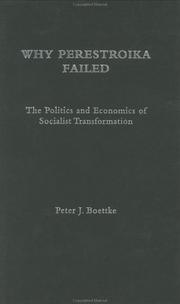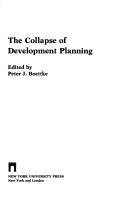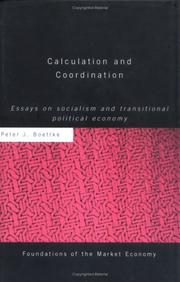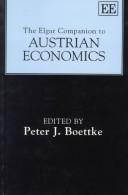| Listing 1 - 10 of 43 | << page >> |
Sort by
|

ISBN: 0415085144 Year: 1993 Publisher: London : Routledge,
Abstract | Keywords | Export | Availability | Bookmark
 Loading...
Loading...Choose an application
- Reference Manager
- EndNote
- RefWorks (Direct export to RefWorks)
Perestroika --- Perestrojka --- Pérestroïka --- SU / Soviet Union - Ussr - Urss --- 331.31 --- 331.30 --- 330.580 --- 330.540 --- 331.32 --- Economisch beleid. --- Economische toestand. --- Gecontroleerde economie. Geleide economie. Welvaarststaat. Algemeenheden. --- Socialistische stelsels: algemeenheden. --- Structuur van de economie. --- Perestroĭka. --- Socialism --- Perestroĭka --- Economic restructuring (Soviet Union) --- Perestroyka --- Socialistische stelsels: algemeenheden --- Gecontroleerde economie. Geleide economie. Welvaarststaat. Algemeenheden --- Economische toestand --- Economisch beleid --- Structuur van de economie --- Soviet Union --- Economic conditions --- Economic policy --- 1986-1991

ISBN: 0814712258 9780814712252 0814712169 0814723454 Year: 1994 Volume: *1 Publisher: New York (N.Y.): New York University press,
Abstract | Keywords | Export | Availability | Bookmark
 Loading...
Loading...Choose an application
- Reference Manager
- EndNote
- RefWorks (Direct export to RefWorks)
Développement économique --- Economic development --- Economic growth --- Economische ontwikkeling --- Case studies --- Economic development - Case studies

ISBN: 0415238137 0415771099 1280404191 0203469682 0429232675 1134557310 9780203469682 9780415238137 9781134557318 9780429232671 9781280404191 9781134557264 9781134557301 9780415771092 1134557302 Year: 2001 Publisher: London New York Routledge
Abstract | Keywords | Export | Availability | Bookmark
 Loading...
Loading...Choose an application
- Reference Manager
- EndNote
- RefWorks (Direct export to RefWorks)
This collection of essays from one of the major Austrian economists working in the world today brings together in one place some of his key writings on a variety of economic issues.
Marxian economics. --- Austrian school of economics. --- Social choice. --- Soviet Union --- Economic policy. --- Marxist economics --- Choice, Social --- Collective choice --- Public choice --- Austrian school of economists --- Marginalist school of economics --- Communism --- Schools of economics --- Socialism --- Choice (Psychology) --- Social psychology --- Welfare economics --- Marginal utility
Book
ISBN: 1849806470 1849809518 9781849806473 9781849809511 9781847204110 1283457768 9786613457769 1847204112 Year: 2010 Publisher: Cheltenham: Elgar,
Abstract | Keywords | Export | Availability | Bookmark
 Loading...
Loading...Choose an application
- Reference Manager
- EndNote
- RefWorks (Direct export to RefWorks)
Economics --- Austrian school of economics --- AA / International- internationaal --- 330.46 --- Hedendaagse periode, met inbegrip van de psychologische school (Oostenrijkse), mathematische school, solidarisme, communisme, marxisme, bolsjewisme, anarchisme. --- Macroeconomics --- Microeconomics --- Value --- Standard of value --- Cost --- Exchange --- Wealth --- Prices --- Supply and demand --- Price theory --- Austrian school of economists --- Marginalist school of economics --- Schools of economics --- Marginal utility --- Hedendaagse periode, met inbegrip van de psychologische school (Oostenrijkse), mathematische school, solidarisme, communisme, marxisme, bolsjewisme, anarchisme --- Economic schools --- Austria --- Evolutionary economics --- Economists --- Austrian school of economics. --- Economists - Austria --- École autrichienne d'économie politique --- Économie politique --- Histoire --- Autriche
Book
ISBN: 9781598130751 9781598130720 Year: 2012 Publisher: Oakland, Calif. Independent Institute
Abstract | Keywords | Export | Availability | Bookmark
 Loading...
Loading...Choose an application
- Reference Manager
- EndNote
- RefWorks (Direct export to RefWorks)
Methodology of economics --- Economics --- 330.1 --- 475 --- AA / International- internationaal --- Economic theory --- Political economy --- Social sciences --- Economic man --- History --- Study and teaching --- Domein en natuur van de staathuishoudkunde --- Onderwijs van de politieke, economische en sociale wetenschappen
Book
ISBN: 9781137411594 9781137411600 1137411597 1137411600 Year: 2018 Publisher: London : Palgrave Macmillan UK : Imprint: Palgrave Macmillan,
Abstract | Keywords | Export | Availability | Bookmark
 Loading...
Loading...Choose an application
- Reference Manager
- EndNote
- RefWorks (Direct export to RefWorks)
This book explores the life and work of Austrian-British economist, political economist, and social philosopher, Friedrich Hayek. Set within a context of the recent financial crisis, alongside the renewed interest in Hayek and the Hayek-Keynes debate, the book introduces the main themes of Hayek’s thought. These include the division of knowledge, the importance of rules, the problems with planning and economic management, and the role of constitutional constraints in enabling the emergence of unplanned order in the market by limiting the perverse incentives and distortions in information often associated with political discretion. Key to understanding Hayek's development as a thinker is his emphasis on the knowledge problem that economic decision makers face and how alternative institutional arrangements either hinder or assist them in overcoming that epistemic dilemma. Hayek saw order emerging from individual action and responsibility under the appropriate institutional order that itself emerges from actors discovering new and better ways to coordinate their behavior. This book will be of interest to all those keen to gain a deeper understanding of this great 20th century thinker in economics. Peter Boettke is University Professor of Economics and Philosophy, Director of the F. A. Hayek Program for Advanced Study in Philosophy, Politics, and Economics, at George Mason University, USA..
Economic schools --- Hayek, Friedrich --- Political science --- Economics --- von Hayek, Friedrich August, - 1899-1992 - Political and social views --- von Hayek, Friedrich August, - 1899-1992 --- Economic history. --- Political economy. --- Economic policy. --- History of Economic Thought/Methodology. --- International Political Economy. --- Economic History. --- Economic Policy.

ISBN: 1858987768 Year: 1998 Publisher: Cheltenham Elgar
Abstract | Keywords | Export | Availability | Bookmark
 Loading...
Loading...Choose an application
- Reference Manager
- EndNote
- RefWorks (Direct export to RefWorks)
Digital
ISBN: 9781137411594 9781137411600 Year: 2018 Publisher: London Palgrave Macmillan
Abstract | Keywords | Export | Availability | Bookmark
 Loading...
Loading...Choose an application
- Reference Manager
- EndNote
- RefWorks (Direct export to RefWorks)
This book explores the life and work of Austrian-British economist, political economist, and social philosopher, Friedrich Hayek. Set within a context of the recent financial crisis, alongside the renewed interest in Hayek and the Hayek-Keynes debate, the book introduces the main themes of Hayek’s thought. These include the division of knowledge, the importance of rules, the problems with planning and economic management, and the role of constitutional constraints in enabling the emergence of unplanned order in the market by limiting the perverse incentives and distortions in information often associated with political discretion. Key to understanding Hayek's development as a thinker is his emphasis on the knowledge problem that economic decision makers face and how alternative institutional arrangements either hinder or assist them in overcoming that epistemic dilemma. Hayek saw order emerging from individual action and responsibility under the appropriate institutional order that itself emerges from actors discovering new and better ways to coordinate their behavior. This book will be of interest to all those keen to gain a deeper understanding of this great 20th century thinker in economics. Peter Boettke is University Professor of Economics and Philosophy, Director of the F. A. Hayek Program for Advanced Study in Philosophy, Politics, and Economics, at George Mason University, USA.[10231808]
Book
ISBN: 1786605651 9781786605658 Year: 2018 Publisher: Lanham : Rowman & Littlefield Publishers,
Abstract | Keywords | Export | Availability | Bookmark
 Loading...
Loading...Choose an application
- Reference Manager
- EndNote
- RefWorks (Direct export to RefWorks)
This volume critically explore and extend Hayek’s Nobel Prize-winning work on knowledge and social interconnectedness from the disciplines of law, economics, philosophy, anthropology, political science, and history. Hayek’s insights about knowledge become even more important once it is recognized that nothing in the social world occurs in isolation. There is no such thing as a distinct economic, political, or social sphere—they are inextricably intertwined. Given the range of both Hayek’s work and the contributing authors’ perspectives, the range of topics covered in this volume is extraordinarily wide, running the gamut from immigration, to white supremacy, to ancient agricultural practices, to the nature of what it means to be free.
Book
ISBN: 1598130757 1598130870 Year: 2012 Publisher: Oakland, Calif. : Independent Institute,
Abstract | Keywords | Export | Availability | Bookmark
 Loading...
Loading...Choose an application
- Reference Manager
- EndNote
- RefWorks (Direct export to RefWorks)
A great supplemental text for the teaching of economics, this book offers a clear perspective and a passion for a deeper understanding of the subject. Economics is not merely a game to be played by clever professionals, but a discipline that touches upon the most pressing practical issues at any historical juncture. The wealth and poverty of nations is at stake; the length and quality of life turns on the economic conditions individuals find themselves living within. Touching upon a variety of subjects?including market socialism, political economy, and economics education?this reference contai
Economics --- Economics. --- Study and teaching. --- History.
| Listing 1 - 10 of 43 | << page >> |
Sort by
|

 Search
Search Feedback
Feedback About UniCat
About UniCat  Help
Help News
News